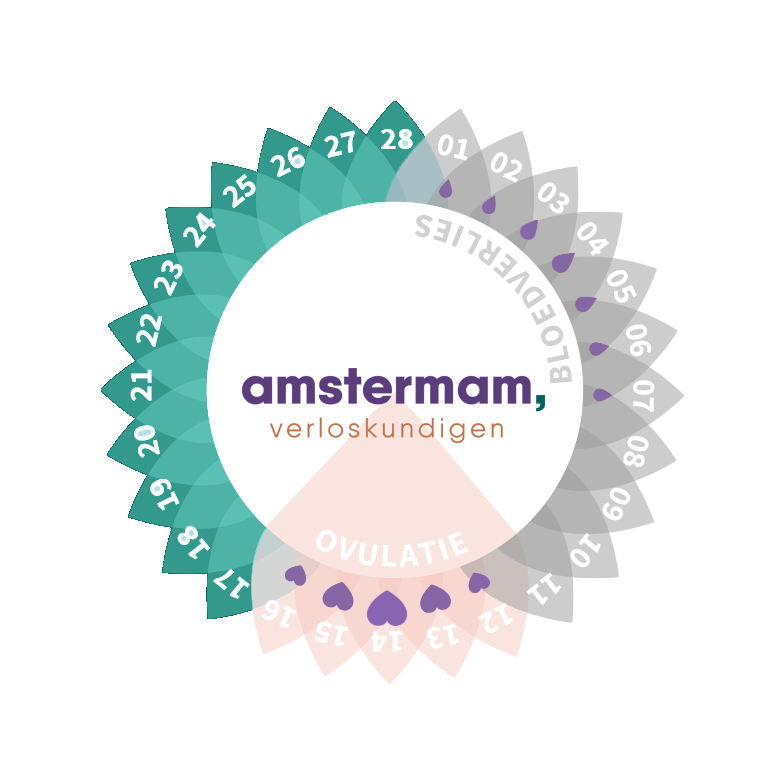Determine your ovulation
What are the most fertile days, when is your ovulation, how does an ovulation test work and how can you calculate impantation?
What are the most fertile days, when is your ovulation, how does an ovulation test work and how can you calculate impantation?
Er zijn dan een aantal vruchtbare dagen: bij een regelmatige cyclus kun 3-4 dagen voor de ovulatie je al zwanger worden tot en met een dag na de eisprong. Je kunt de eisprong berekenen om te weten welke vruchtbare dagen er zijn. Online zijn hier handige calculators .

At the beginning of her fertile period (around puberty) a woman has thousands of egg cells in both ovaries. After approximately 100 days of maturation in a small sac called a follicle, an egg cell becomes ready. During the final days of this maturation process, under the influence of estrogen, the uterine lining becomes thinner, making it more accessible for sperm cells. This results in a surge of luteinizing hormone, also known as LH-peak . This stimulates the release of the egg from the follicle in the ovary. The egg then travels to the uterus through the fallopian tube. Ovulation has occurred.
What are the signs of an ovulation?
You can recognize ovulation by an increase of vaginal discharge, more slimy and thicker than you are used to, 3-4 days before and up to 2 days after ovulation. This makes it easier for sperm cells to reach the released egg.
You can measure the LH peak in your urine with an ovulation test. This test is available at drugstores and pharmacies without a prescription. You often test for several days; a few days before you suspect ovulation and a few days after.
Just after ovulation, your body temperature rises by 0.2-0.5 degrees for a few days.
An increasing libido, headache or nausea may occur.
Once the egg cell has been released, it starts its journey in the fallopian tube with the final destination being the uterus.
If ejaculation occurs in the vagina shortly before ovulation, sperm cells will be waiting in the fallopian tube. The egg is fertile for 24 hours after ovulation, and fertilization happens in the middle part of the fallopian tube. The egg and sperm cell combine into one large cell, which then undergoes several cell divisions.
To calculate the implantation you add 9 days to your ovulation. That is 5 days before your next period starts.
The thick uterine lining, influenced by progesterone, allows the egg to implant. About 7 days after implantation, the HCG hormoon becomes detectable. This can be detected through a urine pregnancy test, which tells you whether you're pregnant or not. You may also notice changes in your body and mood. Nausea, headaches, tender and swollen breasts, light spotting, and mood swings can be the first signs of implantation.
The chance of a good implantation is about 50%. This depends, among other things, on the quality and health of the endometrium, your age and whether the cell divisions have been successful.
If the egg is not fertilized, the progesterone level will slowly increase. The endometrium thins again, is shed and menstruation will start.
To become pregnant, having intercourse every two or three days is usually sufficient. More frequent intercourse is fine but not necessary. Sperm cells can survive for a few days in the uterus. If you know when ovulation occurs, most pregnancies result from intercourse in the six days before ovulation.

Do you have questions about your ovulation or do you desire to have a baby? Visit our fertility consultation with one of the midwives (reimbursed if you have Dutch or EU health insurance). Please call our assistant at 020-2103170 to make an appointment at one of our three locations.



Do you have any questions about ovulation or getting pregnant? Please contact our assistant and we will be happy to answer them.
And would you like to get acquainted with our practice? Then sign up for Meeting amstermam.

Register now without obligation within 2 minutes, and receive a response within one working day!